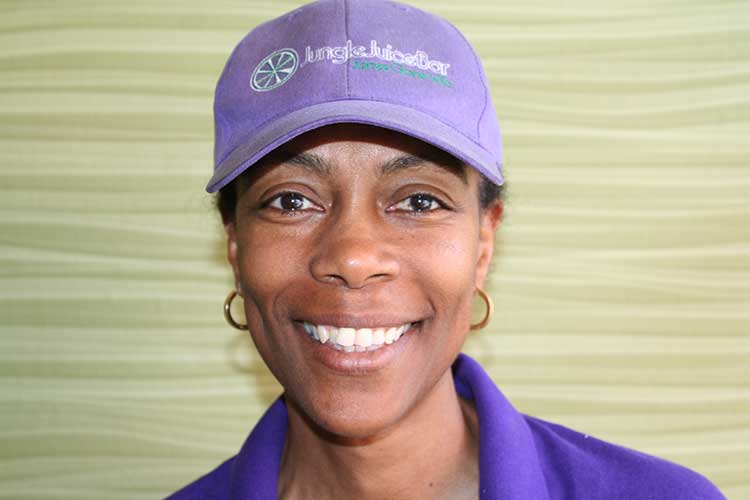Juice bar unites Grosse Pointe and Detroit kids around healthy food
Melinda Clynes |
Wednesday, June 29, 2016
Bringing together diverse communities, particularly those with extreme economic and racial differences, can sometimes come about in strange and unexpected ways.
Such is the case with the Jungle Juice Bar, a three-year-old business located on Charlevoix St. in Grosse Pointe Park, just across Alter Road and the Detroit border.
 Regeania Coleman. Photo by Melinda Clynes.Owner Regeania Coleman turned to juicing years back as a way to prevent colds and improve her energy and health. After being laid off from her corporate job in the auto industry, she made the decision to start the business.
"I wanted to do something else that was more aligned with my philosophy and my lifestyle, so I opened a juice bar," she says.
One of the reasons Coleman chose the location was because she wanted to be in an underserved area where her product could make an impact on the health of patrons, both by offering nutritious fare and by providing a venue for nutrition education and community building.
Along with selling juices and sharing nutritional information, Jungle Juice brings Detroiters and Grosse Pointers together for food preparation classes, lectures, and healthy cooking demonstrations. This summer, the juice bar is hosting a healthy cooking class for kids and a five-day cooking day camp taught by a former school teacher and whole-food specialist.
Coleman also opens her space at no charge for groups to use. Jungle Juice Bar is a hosting site for the Holistic Chamber of Commerce Detroit-Downtown Chapter
Regeania Coleman. Photo by Melinda Clynes.Owner Regeania Coleman turned to juicing years back as a way to prevent colds and improve her energy and health. After being laid off from her corporate job in the auto industry, she made the decision to start the business.
"I wanted to do something else that was more aligned with my philosophy and my lifestyle, so I opened a juice bar," she says.
One of the reasons Coleman chose the location was because she wanted to be in an underserved area where her product could make an impact on the health of patrons, both by offering nutritious fare and by providing a venue for nutrition education and community building.
Along with selling juices and sharing nutritional information, Jungle Juice brings Detroiters and Grosse Pointers together for food preparation classes, lectures, and healthy cooking demonstrations. This summer, the juice bar is hosting a healthy cooking class for kids and a five-day cooking day camp taught by a former school teacher and whole-food specialist.
Coleman also opens her space at no charge for groups to use. Jungle Juice Bar is a hosting site for the Holistic Chamber of Commerce Detroit-Downtown Chapter and the
AlterGather community organization. Both groups actively bring people together from city and suburbs.
Last spring, Coleman participated in a Motor City Makeover event to clean up the area along Alter Road. The experience brought home just how stark the dividing line is between the affluent Grosse Pointes and the impoverished east side of Detroit. It also affirmed her desire to create a connection between the two communities.
"It's a challenge because there's this invisible psychological wall, and one side almost doesn't want to interact with the other," says Coleman. "We are a bridge, because when people come in and participate in the various classes, it brings the two communities together."
Coleman has a nonprofit side to her business too, which allows her to accept donated fruit and provide nutrition education at Detroit Merit Charter Academy and
Ronald Brown Academy, both in Detroit. The "squeezes," as Coleman likes to call the events, expose students to the health benefits of fresh juices and smoothies—even green ones with kale that kids are hesitant to taste.
"We talk to them about the importance of eating healthy, protecting the environment, and conducting themselves with honor," she says.
At Merit Academy, Jungle Juice Bar is involved with the school garden program. During harvest time, Coleman does a juicing demonstration at the school using produce grown in the garden, like peppermint, and juicing it with a grocery story item, like apple.
"We let them sample and taste it so they can see how much fun it is and how tasty it is to juice their own herbs."
Many times, students bring their parents to Jungle Juice Bar because Coleman gives them a coupon, which often sparks a conversation about healthy eating that can make an impact on the whole family. Coleman hires from within the community, targeting individuals who might not otherwise be exposed to a health-promoting work culture.
"I'm providing opportunities for employment,” says Coleman. "For some high schoolers and other people who may not have been in the workforce for a while or are just are locked out for whatever reason, I feel a responsibility to them."
Coleman also takes care to keep her juices affordable, even if that means sacrificing some of the profits. "My drinks are probably the cheapest juices in town," says Coleman. "Being an inclusive business means that everybody prospers together," she says.
This article is part of Michigan Nightlight, a series of stories about the programs and people that positively impact the lives of Michigan kids. It is made possible with funding from the W.K. Kellogg Foundation. Read more in the series here.